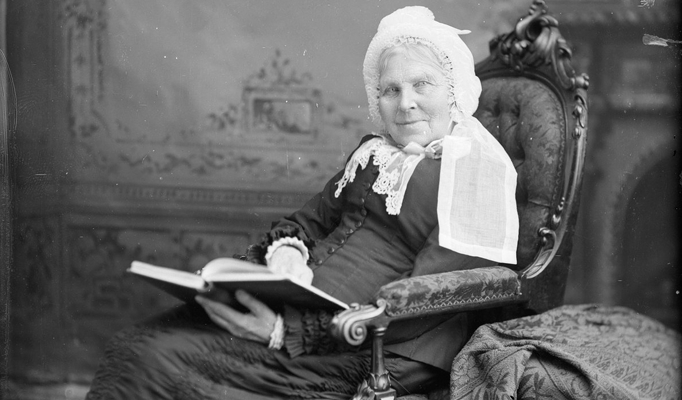
Catharine Parr Trail was one of Canada’s most important early writers. The Encyclopedia Britannica speaks of Catharine, who, with richly detailed descriptions of frontier life, was one of the first to praise the beauties of the Canadian landscape. She was particularly famous for her books: The Backwoods of Canada (1836) and Canadian Crusoes (1852). She also wrote The Female Emigrant’s Guide, The Tell Tale, The Young Emigrants, and Hints on Canadian Housekeeping.
Like many other English citizens, following the 1803-1815 Napoleonic wars, Catharine Strickland and her sisters were left destitute. Catharine married Thomas Traill, a poor Scottish soldier with a peace-time half-salary who was offered a land grant in Canada. She wrote a farewell letter to a good friend, saying that “she (was) willing to lose all for the sake of one dear valued friend and husband to share all the changes and chances of a settler’s life.”
Canada was seen as the land of milk and honey. Between 1831 and 1841, 655,747 people sailed away from British shores. Catharine Parr Traill’s books brought many of our ancestors to Canada.
Of the six Strickland daughters including Catharine, five of them became published authors. Catharine’s older sister, Agnes, in England was the leading royal biographer of the 19th century.
Catharine Parr Traill had a remarkable ability to rise above adversity and make the best of every situation. It is hard for us, 200 years later, to fully envision the miseries of hunger, disease, cold, and disappointment faced by our early Canadian pioneers. Catharine family came down with malaria, a widespread problem in Canada in Ontario, as pioneers were struggling to drain mosquito-infested swamps. Catharine’s motto was ‘Hope! Resolution! And Perseverance!’ She would assure her relatives back home that Canada is the ‘land of hope.’
Nature, for Catharine, was saturated with divine meaning – its splendour and concord displayed the authority and goodness of its Creator. That is why Catharine wrote many books that reflected a sheer love of nature’s bounty and admiration in God’s handiwork. The flowers of the field, for her, were good reminders of the teachings of Christ. Catharine often illustrated her dried specimens with biblical quotes, particularly from the Psalms or the Book of Revelation.
In the midst of her very busy writing and pioneering, Catharine never neglected her family. As author, Charlotte Grey put it, “Motherhood came as naturally to Catharine as breathing. It was the most meaningful activity in her life.“
Despite her prolific book writing, Catharine faced dire poverty in the early pioneering days: “On examining the state of my purse, I find just $4.30. This is all the funds I have to begin the year with. It is true that I have half a barrel of flour, and some meat and I have often been without meat and money. God will provide as heretofore.”
She wrote in 1852 to her sister Susanna: “I feel it is a miserable state to be like a vessel without a pilot drifting before an overwhelming storm on every side rocks and shoals and no friendly port in sight, no beacon light to guide us on our perilous way. Do not think, dear sister, that I lose my faith in God’s gracious providence. I believe that he can in his good time bring all things to an end of these our troubles…”
Catharine’s husband, Thomas, was often downcast by the financial challenges they faced. Catharine wrote: “I wish that he could look beyond the present and remember that the brightest of earthly prospects endure but for a season – and it is the same with the trials and sorrows of life –they too come to an end.”
As Charlotte Gray notes, “Catherine at ninety-five was left virtually penniless…Without Catharine’s knowledge, an urgent plea was sent to the British Prime Minister, at 10 Downing Street, for help…” Over $1,000 was raised. Along with the money was sent a letter to Catharine saying: “We cannot forget the courage with which you endured the privations and trials of the backwoods in the early settlement of Ontario, and we rejoice to know that your useful life has been prolonged in health and vigor until you are now the oldest living author in her Majesty’s dominion.” Catharine responded by saying: “I can only adopt the hearty simple phrase used by the Indian women of Hiawatha village–‘I bless you in my heart.’”
Catharine noted at the end of her life, “Strength was always given to me when it was needed. In great troubles and losses, God is very good.”
May Catharine Parr Traill’s pioneering set on fire a new generation of Canadian authors.

Leave a Reply